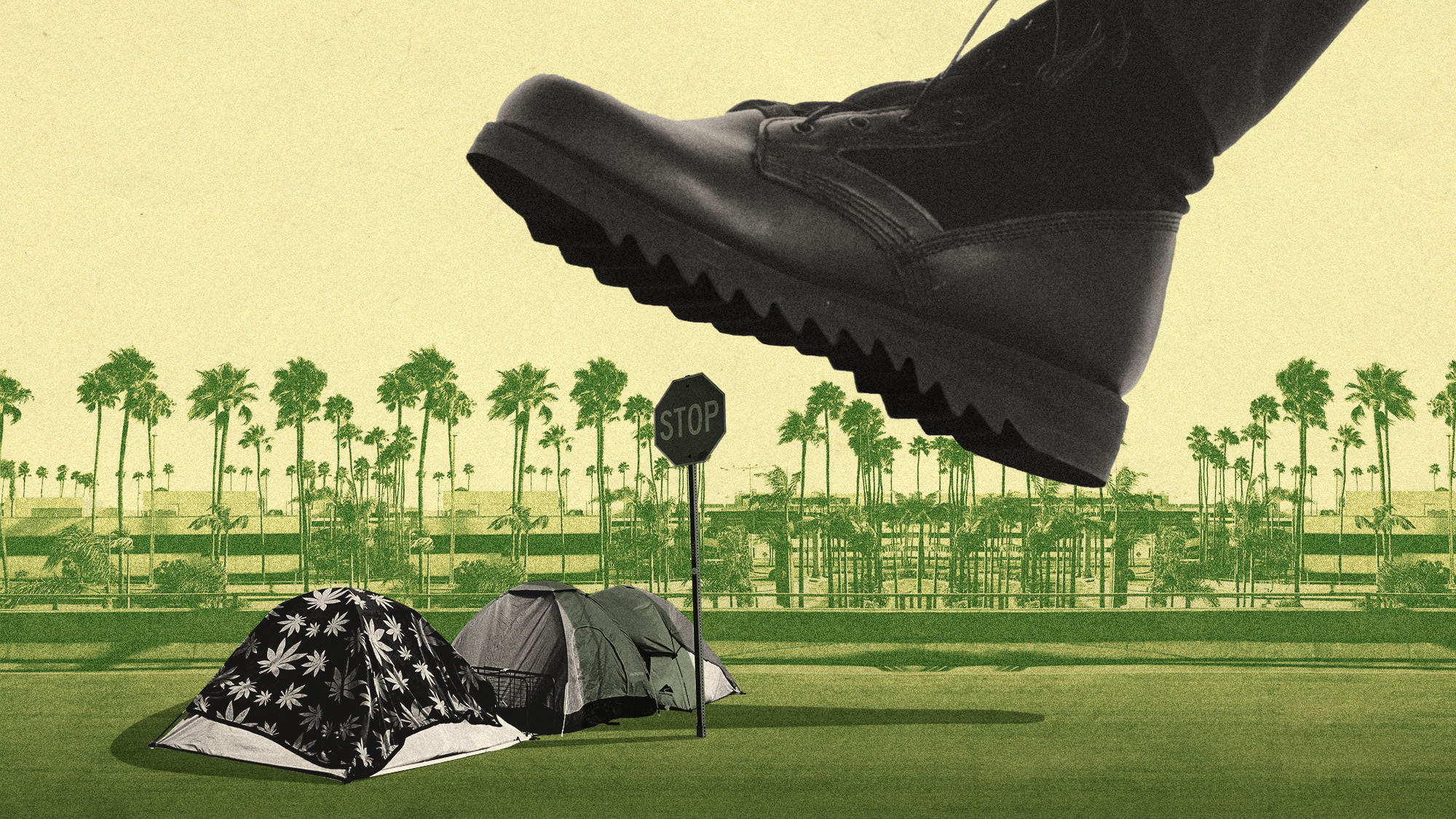California's new proposal to address homelessness: an encampment ban
Senate Bill 1011 would prohibit encampments around 'sensitive community areas'


A free daily email with the biggest news stories of the day – and the best features from TheWeek.com
You are now subscribed
Your newsletter sign-up was successful
California continues to struggle with its staggering homeless population as lawmakers in cities across the Golden State scramble to care for the hundreds of thousands of unhoused Californians. Politicians seem to agree that the homelessness epidemic is perhaps the paramount crisis facing the state, and one way they are attempting to find a solution is through a proposed bill that would ban homeless encampments.
The bipartisan proposal, California Senate Bill 1011, would make it illegal for homeless people to form encampments near most public spaces while also creating incentives for unhoused people to use homeless shelters. While most agree that a legislative agenda is necessary to solve California's homelessness crisis, there are some legal questions surrounding the passage of SB 1011. What exactly does the bill entail, and how would it affect the state's homeless population if it were to pass?
What would SB 1011 do?
SB 1011 would prohibit homeless encampments "within 500 feet of a public or private school, open space or major transit stop, as specified," the text of the proposed bill said. In addition, SB 1011 would prohibit homeless people from "sitting, lying, sleeping or storing, using, maintaining or placing personal property upon a street or sidewalk" if there is an available homeless shelter they can go to instead. Violating the law could result in a misdemeanor criminal charge, but this would come "at the discretion of the prosecutor," the bill said.
The Week
Escape your echo chamber. Get the facts behind the news, plus analysis from multiple perspectives.

Sign up for The Week's Free Newsletters
From our morning news briefing to a weekly Good News Newsletter, get the best of The Week delivered directly to your inbox.
From our morning news briefing to a weekly Good News Newsletter, get the best of The Week delivered directly to your inbox.
The bill also cited existing laws that note that someone who "willfully and maliciously obstructs the free movement of any person on any street, sidewalk or other public place is guilty of a misdemeanor." SB 1011 outlines more severe penalties for these already in-place violations.
What has the response been from lawmakers?
The reaction to SB 1011 appears to be mostly positive. California Senate Minority Leader Brian Jones (R), who introduced the bill, said Californians "should not have to tolerate the encampments that now fill our open spaces with trash, needles and human waste."
"We know that clearing encampments is possible when there is the political will to do so," Jones said in a statement. "It's dangerous, inhumane and unhealthy for homeless individuals to live on sidewalks, near our schools and transit stops and in our open spaces. It's also not safe or fair to nearby neighbors and local businesses." SB 1011 will "help compassionately clear encampments, clean up California and protect public safety and health," Jones said.
"Public spaces are not living spaces. People deserve to live inside, and the public deserves to use their parks, sidewalks and streets as they were designed. This bill is a step toward creating that reality," State Sen. Catherine Blakespear (D), a co-sponsor of SB 1011, said in the same statement. Addressing homelessness is a "shared responsibility to ensure our most vulnerable populations receive the proper care, resources and shelter to begin rebuilding their lives," State Sen. Marie Alvarado-Gil (D) also said in the same statement.
A free daily email with the biggest news stories of the day – and the best features from TheWeek.com
How likely is SB 1011 to pass?
While support for the bill is high, its prospects for passage "likely hinge on a U.S. Supreme Court ruling in a case that could determine whether cities can legally ban or restrict people sleeping on the streets or in other public places," the Los Angeles Times said. That case, Grants Pass v. Johnson, is being fought over an Oregon city ordinance that says people cannot "sleep on public sidewalks, streets or alleyways at any time as a matter of individual and public safety."
An appeals court declared that ordinance unconstitutional, and the Supreme Court will have the final say on the matter later this year. Cities in California have also faced lawsuits over similar homelessness restrictions. As a result, how the Supreme Court rules will likely determine the legality of SB 1011.
Ahead of Grants Pass being heard, California Gov. Gavin Newsom (D) filed an amicus brief in an attempt to sway the Supreme Court to allow for action against homeless encampments. "While I agree with the basic principle that a city shouldn't criminalize homeless individuals for sleeping outside when they have nowhere else to go within that city's boundaries, courts continue to reach well beyond that narrow limit to block any number of reasonable efforts to protect homeless individuals and the broader public from the harms of uncontrolled encampments," Newsom said in an accompanying statement.
Justin Klawans has worked as a staff writer at The Week since 2022. He began his career covering local news before joining Newsweek as a breaking news reporter, where he wrote about politics, national and global affairs, business, crime, sports, film, television and other news. Justin has also freelanced for outlets including Collider and United Press International.
-
 Switzerland could vote to cap its population
Switzerland could vote to cap its populationUnder the Radar Swiss People’s Party proposes referendum on radical anti-immigration measure to limit residents to 10 million
-
 Political cartoons for February 15
Political cartoons for February 15Cartoons Sunday's political cartoons include political ventriloquism, Europe in the middle, and more
-
 The broken water companies failing England and Wales
The broken water companies failing England and WalesExplainer With rising bills, deteriorating river health and a lack of investment, regulators face an uphill battle to stabilise the industry
-
 How are Democrats trying to reform ICE?
How are Democrats trying to reform ICE?Today’s Big Question Democratic leadership has put forth several demands for the agency
-
 Judge rejects California’s ICE mask ban, OKs ID law
Judge rejects California’s ICE mask ban, OKs ID lawSpeed Read Federal law enforcement agents can wear masks but must display clear identification
-
 Big-time money squabbles: the conflict over California’s proposed billionaire tax
Big-time money squabbles: the conflict over California’s proposed billionaire taxTalking Points Californians worth more than $1.1 billion would pay a one-time 5% tax
-
 Trump links funding to name on Penn Station
Trump links funding to name on Penn StationSpeed Read Trump “can restart the funding with a snap of his fingers,” a Schumer insider said
-
 Trump reclassifies 50,000 federal jobs to ease firings
Trump reclassifies 50,000 federal jobs to ease firingsSpeed Read The rule strips longstanding job protections from federal workers
-
 Supreme Court upholds California gerrymander
Supreme Court upholds California gerrymanderSpeed Read The emergency docket order had no dissents from the court
-
 ‘Various international actors hope to influence the result for their own benefit’
‘Various international actors hope to influence the result for their own benefit’Instant Opinion Opinion, comment and editorials of the day
-
 Trump demands $1B from Harvard, deepening feud
Trump demands $1B from Harvard, deepening feudSpeed Read Trump has continually gone after the university during his second term
